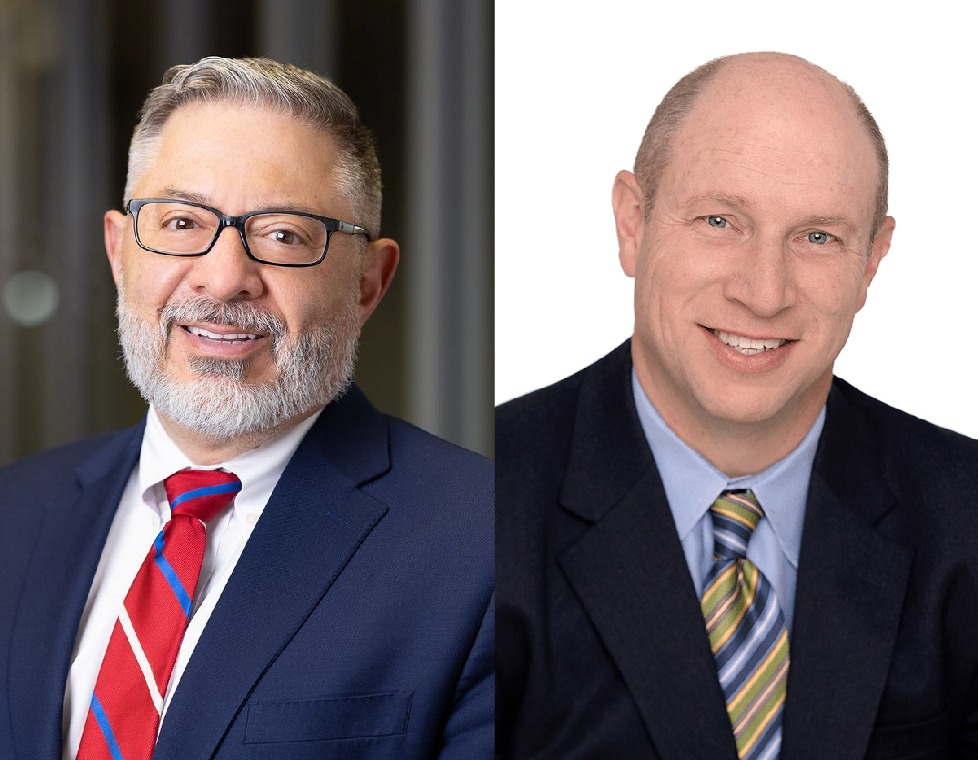To insist that only lawyers can give legal advice, says Deno Himonas, is like saying only highly trained and expensive specialists can take care of patients—an assumption he calls “the cardiac surgeon version of the law.” What if only doctors could draw blood, he asks? “That’s the analogy we’re dealing with.”
Himonas, who retired in 2022 as a justice on the Utah Supreme Court, is currently Innovator-in-Residence at the S.J. Quinney College of Law, where he encourages students to examine the regulatory status-quo that governs lawyers in America. His first order of business: Create a course called “Disrupting Regulation,” co-taught with Rick Hoffman, a forensic accountant who is one of two non-lawyer commissioners on the Utah Bar.
The pilot course this year introduced a small cohort of second and third year students to the whys behind the need for reform, then had them develop a project tackling a real-life situation.
Utah lawyers are generous with their time, providing hours of pro bono work, notes Himonas, “but it hasn’t made a dent in the access-to-justice problem.”
In Utah’s Third District, for example, only two percent of defendants in landlord-tenant disputes have historically had legal representation; the number drops to less than one percent in debt collection cases. As Hoffman says: “A person who has a $2,000 problem can’t afford a $3,000 attorney fee to fix it.” One solution: Let trained non-lawyer practitioners—human or software—provide legal advice and services.
Hoffman and Himonas challenged their students to come up with a real-world solution they could complete in one semester. After discussing several bigger issues, including training non-lawyers to provide post-conviction relief services, the students settled on designing a no-cost app to help people change their name and/or gender markers on Utah state records—currently a confusing and sometimes expensive process.
Student Andy Miller had volunteered at the Pro Bono Initiative’s Rainbow Law clinic so was familiar with the need to make the experience not only clearer but also not one more trauma trigger for transgender adults who, as Miller says, “already experience greater scrutiny and criticism from society at large.” For example, rather than simply asking name-change applicants if they were on any sex offender or child abuse registries, the app could explain first that the question is a state requirement for all name changes.
As they researched the need, the class discovered that an online tool—Identity 650—was already being developed by SixFifty, the Utah-based software subsidiary of tech law firm Wilson Sonsini. The students then worked with SixFifty to streamline the app, including having Miller and Esther Johnson translate it into Spanish.
“The class was absolutely crucial in building the tool,” says Ransom Wydner, SixFifty’s vice-president for pro bono and social impact. “The user experience is significantly better.”
Wydner points to research in the medical journal The Lancet showing that, in a sample of over 22,000 transgender adults, those with new IDs that matched their gender had “reduced psychological distress, suicidal ideation, and suicide planning.” Conversations with trans and non-binary adults who have been able to secure gender-concordant IDs, Wydner adds, point to not just a reduction in bad outcomes, but a feeling of joy and normalcy.
Himonas, who joined the Salt Lake office of Wilson Sonsini after his retirement from the bench, was not aware of his firm’s connection to the Identity 650 on-line tool when the students settled on the gender-marker project, and quickly notified and worked through any issues with the law school. His connection to the gender-marker issue goes back to a 2021 case before the Utah Supreme Court, in which he wrote in the majority opinion: “a person has a common-law right to change facets of their personal legal status, including their sex designation.”
Third-year law student Meg Glasmann says she “jumped at the opportunity” to take the “Disrupting Regulation” class after working as an extern for Himonas on the court, which at the time had recently begun the groundbreaking initiative that established the nation’s first “sandbox” to try out regulatory reforms for the legal profession, monitored by Utah’s Office of Legal Services Innovation to make sure they do no harm.
Utah, says Hoffman, “is on the cutting edge.”
